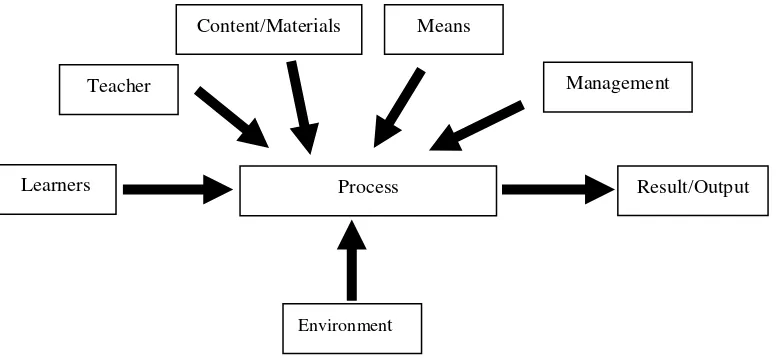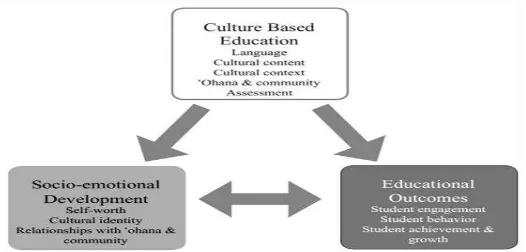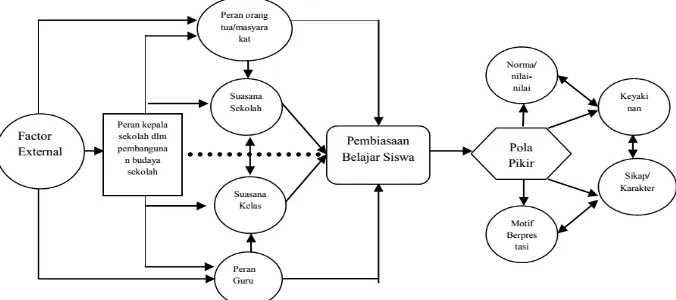Education based cultural in globalization era: case the Indonesian
context
Rahmad Nasir
1, Harun Al-Rasyid
2, Suma Sri Jumiati
3 Educational Management, Graduate Program has institutionalized in units of educational institutions are classified in various disciplines. Educational process is known as a subject of education in teaching-learning activity between a teacher and the students. The changes of paradigm tell that students are not as the receiver knowledge of the teacher only but they have given the freedom to express independently in achieving the goals of education with a variety of learning resources. Moreover, the knowledge, skills, and students‟ behavior are not only through transferring of the transactional knowledge but more than that is the transformation of values from the teacher. The process of transformation the values to students is uneasy to do, so in realizing it, the teacher needs to placement the culture as the basis of education in various educational units. Education and culture are two things that really related and cannot be separated, indeed culture became the basis of the educational implementation process. Culture is talking about the national identity where the education was organized; however, culture also can be mixed by other culture and creating the new culture. The globalization era is allowing the various cultures of the nation gathering each other so whether a nation wants to remain pure in maintaining its own culture or accepting the other positive cultures with selecting first. Culture of the nation can be universalized become the worldwide culture or globalizing the culture. Then education becomes really important in creating quality human resources, cultural products and cultural activities in order to realize the competition and comparative.Keywords: education, culture, and globalization
INTRODUCTION
If traced the level of education issues started from philosophy issues, educational theory, policy of education, managerial until the operational technical education. This derivative systematic gives clarity to the observer or educational actors to be able to dissect the issue of education and provide the appropriate solutions to the complexity problems of education.
In this information era, education has contributed pretty amazing science for development of technologies. Nowadays, for people, technology is like God even people are addicted by all of technology products (acute dependence). Nevertheless, technologies are misused for harms of course by the people itself. Thousands of people died because of the nuclear bomb technology, thousands of porn content are spreading in the internet, science are used to steal the state secrets for personal interests, and experts in corrupt, etc. Looking at the various reports in the media, there is a double standard of something called "technology".
Double standard which is owned by Science and Technology (IPTEK) obtained through education, both formal and non-formal so why are there many people using the technology for something bad or negative goal ? Then hypothesis emerge that there is something wrong with educational process; one of the matter is that education is not based on culture. Culture is systems of value that exist in human life and it became traditions and it has institutionalized in confession and conviction of the particular group of people. In Indonesia, boarding schools that also known as Islamic schools is an example which education is taught through culture like Islamic culture from Arabian and also Javanese culture as a place where education is evolving over time.
Considering that culture as an education base, there needs a plan of educational curriculum that accommodates the culture as an important part of the curriculum content of education in the country. As the identity of nation, culture would like to show the values, social life, and positive habits that can realize the benefit of mankind and this all make it different with value systems of culture from other nations in coloring life as a law of nature.
In Indonesia, culture is a complement of curriculum and not yet received the full attention of the government to be accommodated properly. This matter is caused by education systems which is still not completely decentralized. Schools in the small town are not independently but still controlled by the central government through the ministry of education. Only some regions which explicitly appreciate the culture to be entered in the education system even as regional regulations and supported by the community.
There are many regions that still blind to its potential and characteristic used as the value inserted in the education curriculum. Whereas, if this thing be a concern, then education is developed in accordance with the local wisdom in a place where education was held. Education will be synergistic in schools with people life so that the benefit of education role felt so real to human life.
WRITING METHOD
The method that used in analyzing this issue is the study of literature about cultural-based education in relation to the challenges of globalization in the present era.
LITERATURE REVIEW
Education
The act of Republic of Indonesia No. 20 Year 2003 Article 1 explains that:
“Education is a conscious and deliberate effort to create an atmosphere of learning and the learning process that make learners are actively developing his/her potential to have the spiritual strength, self control, personality, intelligence, good
attitude, and skills that needed for his/herself, society, and the nation.”.
Mean while Nurani Soyomukti (2015: 21) describes education as a process that gives people various situation which aims to empower themselves. The most considered aspects are awareness, enlightenment, empowerment and behavior change.
In the narrow sense, education which institutionalized in the education system almost all of countries in the world through educational institutions such as schools. At least one unit of school there is a process of education in the form of learning processing program that illustrated by Suharsimi Arikunto (2015:7) as follows:
Figure 1.Learning Processing Program
Based on Dalmeri‟s views (2013) that education is a planned effort in mentoring
and learning process for individuals to evolve and grow into an independent people, responsible, creative, knowledgeable, healthy, and noble both physical and spiritual aspects. People who have a noble character with high morality are needs to be established so the civilization of a nation is enforceable. The civilization and culture of a nation has its own kinds which is not only declare about the importance of education, but also able to realize of educational concept by guidance, training and human resource development in a sustainable and equitable.
Culture
Culture is so identical to education that is why in Indonesia there is ministry of
organization called “Kementrian Pendidikan dan Kebudayaan—The Ministry of
Education and Culture”. Pairing these two concepts are reasonable because the state has
built based on characterization of Indonesian culture which varied throughout the
country but united in the motto“Bhineka Tunggal Ika” as the official national motto of Indonesia which means Unity in Diversity.
Learners Process Result/Output
Teacher
Content/Materials Means
Management
In understanding more about culture there are some definition of the various views, such as:
Poerwadarminta (2011: 180) defined culture as the result of activities and the creation of mind (intellect and so on) humans (such as trust, art, customs).
„Culture is that complex whole which includes knowledge, belief, art, morals,
law, custom, and any other capabilities and habits acquired by man as a member
of society.‟ (Tyler in Helen Spencer-Oetay, 2012).
According to Ki Hadjar Dewantara as a figure of Indonesian education (1967: 93-98), culture means the result of human mind, and therefore both inner and outer always contains the properties of the nobility, ethics and aesthetics that exist in human life generally. (Parmi, I. T and Supinah, 2011).
Sir Edward Taylor is a British anthropologist argued that: “Culture... is that
complex whole which includes knowledge, beliefs, arts, morals, law, customs, and any other capabilities and habits acquired by [a human] as a member of
society.” (Wikimedia Commons. From Popular Science Monthly 26 (1884) :
145. Public domain). Ferraro describes culture as a way of human life.
Figure 2.Culture is a way of life
Education on Cultural-Based and Local Wisdom
It has been explaining before that there is a close relation between education and culture. To know what kinds of the relation, it is expressed in the ideas of cultural-based education, including linkages with local wisdom.
Culture is established through education or education is influenced by culturelike Jensen Umi et al describes(2010) about the influence of Hawaiian culture in education as follows:
According to Wagiran (2012) that kearifan lokal is known as local wisdom, local knowledge (pengetahuan setempat) or local genious (kecerdasan setempat). Local wisdom can also be interpreted as an idea about life. The reasoning is based on clear thinking, nice cultivation, and contains positive things. Local wisdom can be translated as an intellect work, deep feelings, character, temperament, and advice for human glory. Control of the local wisdom will carry their souls more virtuous.
Besides those understanding, there is a significant difference among the basic values of traditional hereditary and local wisdom that could be emerged in the actual presents. However, both of them are listed of culture that living in certain social institutions. Specifically, in developing school culture become the institution culture, Yuli Gunawan believes that culture of school are dominant values which supported by school that leads the school's policy against all the elements and components of school including the educational stakeholders, such as doing work in schools as well as the basic assumptions or beliefs, and norms that accepted and implemented together with awareness as a natural behavior creates a common understanding among all elements and school stakeholders.Furthermore Yuli Gunawan describes the frame of school culture development as shown in figure 4.
Figure 4. Diagram direction of development of the school culture
Based Education and Challenges of the Globalization Era
Piötr Sztompkawas quoted by Miftahudin that globalization in generally can be defined as a process that produces a single world. It means that, people around the world have a dependency to one another such as culturally, economically, and politically.
Furthermore, Miftahuddin also quoting of Suyanto‟s thought that process of
education have to prepare the learners who can socialize with people in largely. In the globalization era with so many invention of technology demands people to learn by their own in virtual learning process. The important thing that education needs to build this nation into empowered community in facing the globalization.
Boarding school that more popular with Islamic school or in Indonesia called
Pesantren is the oldest education system that applying the cultural-based education is regarded as a product of Indonesian culture that has indigenous(berkarakter khas). Islamic education institutions are known after the entry of Islam to Indonesia in the seventh century, but it is getting popular around the sixteenth century. Since then it has found many pesantren institutions that teach a variety of classical Islamic booksaboutfiqih, aqeedah or belief, and tasawwuf and became the center of Islamic broadcasting (Islamic da’wah). (Zamakhsary Dhofier in Nurul Yakin, 2014). Education model in Pesantren is expected to compete in education to face the globalization era.
DISCUSSION
After understanding the basic concepts separately,now will be described the kinds of relationship between culture-based education and how its position in facing the globalization era. In improving the civilization, it can be realized through education methods, it is because education is being really important aspect for all nations.
Basically, education is kind of human activity in getting knowledge, skills, and behavioral changes. This concept becomes an idea of mutually agreed.But, the differences characterized by the fact of the cultural differences among nations so the method or approach that used is different, too. If we observes, institute of education like
Pesantren is developing through culture. The spreaders of Islam are success in
combining among education and culture so that‟s why Pesantren still persist with its
popularity. In teaching read and rewrite the Qur‟an, fiqih, aqeedah or belief, and
tasawwuf, etc, it teaches through Indonesian culture which has been influenced by Hinduism as the religion before Islam comes to Indonesia. Slowly but surely, Pesantren
has given its contributions in preparing the young generation of course because of the cultural approach.Pesantren is one kind of education institutions that built based on culture which shown the satisfactory result.
At abstract level, culture is shown as good values in a thing or human activities. In a thing, education can learn the products of culture or reproduce something as a symbol of the culture itself. In kind of activities, education is expected to be able to learn all of cultural act as knowledge and can understand behind the acteven able to preserve it.In preserving the capitalof culture, it needs to be socialized or published and taught about the essence of culture values through education. Socialization is passive that is conservative and active of transformation.
Globalization era is connecting among cultures around the world, like or dislike every nation have to prepare the quality human resources. For example in cooperating at
ASEAN Economic Community‟s program (AEC)which came into force in 2016, there
system is expected to produce all the things of culture and cultural activities with the purpose of facilitating the introduction of national identity and cultural recognition from other nations and of course in boosting economy (increase the people income). To deal with the globalization where technology and information flows are growing rapidly, the nation is required to adapt to the times and at the same time does not leave its identity.To prepare it all, the only way is through the design of culture-based education remains. Culture is meant to preserve all the positive things that are hereditary, if there is a foreign culture it can be adapted.
The other sides, among nations have to learn the cultural characteristics of other nations so get more insight and also saw the potential to be expanded outward in taking advantage for themselves and the nation.Learn other cultures also raise the characteristic of wisdom to appreciate the differences as a law of nature and it is beneficial for order and peace of world.
Design of education course through the curriculum draf that leads to learning activities in schools. School is a seeding place for people so that is where the cultural base needs to be invested strongly in all the educational process in its path, and
Pesantrenis become a model of education institution which applies fully of cultural and religion of course.It because adapts to the culture around the educational process takes place as well as religious education as synonymous with Islam.
CONCLUSION
Education and culture, basically are two things that really different but they have close relation. Education can create the culture or maintain the culture, but the other side culture can also be the bases in implementing education process. When people in their own nation they argued that the other country is strange and it is identical to the international sense, but in the same time sometimes they forgot that their nation is also strange for foreigners as same as they think.
So, their local culture can be universalized as the international culture. It means that, in defending their culture and all of international competition needs to prepare the quality of education design synergistic with existing cultural characteristics.Education designed on the basis of culture itself as a national identity, but not to be anti with foreign cultures.Indeed, an intelligent nation must maintain their own culture while adapting to the times. Technical operations may change in terms of adaptation, but the essence of culture should still be upheld.
At least there are three (3) approaches in driving education ideas based on culture, such as:
(1) Education about the culture is culture used as a content of education. (2) Education as a method of acculturation is the way in doing education.
(3) Education in cultural context that creates a cultural environment in the education unit and the implementation of management with cultural approach.
REFERENCES
Dalmeri. (2013). Pendidikan karakter dalam membangun budaya dan peradaban bangsa, telaah atas filsafat pendidikan ibnu khaldun. Jurnal paedagogia, 2(2). Jakarta: Universitas Indraprasta PGRI Jakarta.
Handout in class: HCW Tylor’s definition of culture Session 2. Wikimedia Commons. From Popular Science Monthly 26 (1884) : 145. Public domain.
Jensen, U., Shawn, K., & Ledward, B. (2010). Culture-based education and its relationship to student outcomes. Honolulu: Kamehameha School Research & Evaluation Division.
Kementrian Pendidikan Nasional. (2007). Undang-undang sistem pendidikan nasional guru dan dosen disertai pasal-pasal penjelas. Yogyakarta : Tim Pustaka Merah Putih.
KMPG Asia Pasific Tax Centre. (2014). The ASEAN economic community 2015 on the road to real business impact. kpmg.com/internationaltax.
Miftahudin. (tanpa tahun). Pendidikan, globalisasi dan akhlak. Yogyakarta: FISE UNY. Oetay., & Helen Spencer. (2012). What is culture? a compilation of cuotations. global
pad core concepts.
Parmi, I. T., & Supinah. (2011). Modul matematika sd program bermutu, pengembangan pendidikan budaya dan karakter bangsa melalui pembelajaran matematika di SD. Jakarta: Kementrian Pendidikan Nasional.
Poerwadarminta, W. J. S. (2011). Kamus Umum bahasa indonesia edisi ketiga. Jakarta: Balai Pustaka.
Setyawan, D. A. (Tanpa tahun). Ilmu sosial budaya dasar (ISBD). pengertian dan konsep dasar kebudayaan.
Soyomukti, N. (2015). Teori-teori pendidikan dari tradisional, (neo) liberal, marxis-sosialis, hingga postmodern. Yogyakarta: Arruz-Media.


